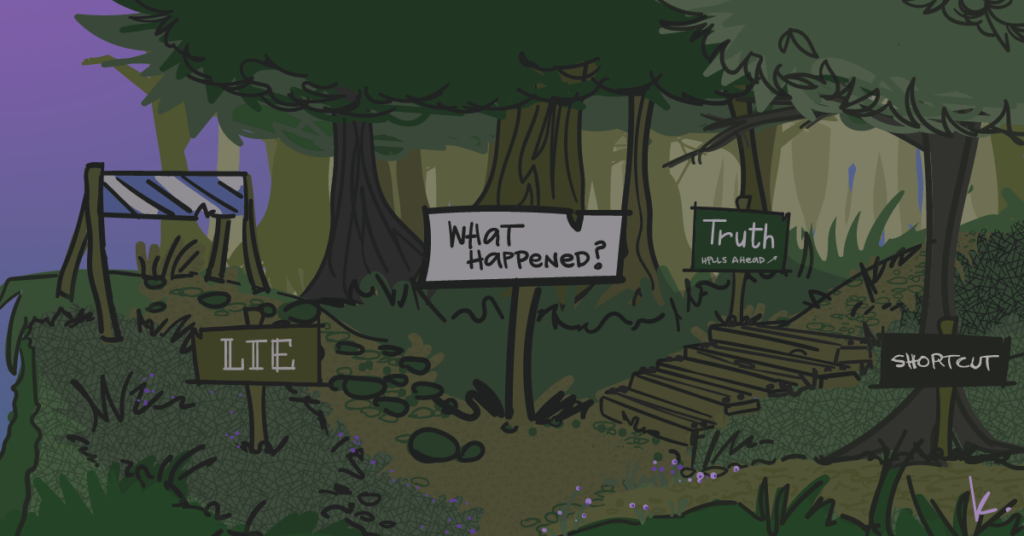5 minute read. Content warning: References to mental health struggles, discussions on manipulation and unreliable narrators
- At what point does this memory share a similar feeling or diverge away from one another? (5)
chatGPT Summary: Kay examines how memory acts as a container influenced by changing perspectives, discusses the theme of the unreliable narrator, and reflects on how manipulation and storytelling shape our perceptions.
Vancouver, on the ancestral lands and waters of many Coast Salish peoples – Because I see memory as a container, something to be grabbed from a shelf, the shelf stored within a piece of furniture or room numbered by age, comparing one memory to another or one feeling to another is easy. But while the method may be the same, but the librarian, me, is constantly changing. How I interpret or tell a story about the two objects or objects within the containers will depend on the Kay that pulled them out, what they have eaten (and have they washed their hands), what the time of day is, and whether or not my cat is ready to pounce. For this prompt, I will think about “delivery” and how storytelling can take two similar and unchanging things and deliver a different story every time. I’m excited to explore the unreliable narrator trope.
James Frey, in How to Write a Damn Good Novel, II: Advanced Techniques for Dramatic Storytelling, states that an unreliable narrator is a narrator who cannot be trusted, one whose credibility is compromised. I haven’t read this book, by the way – it’s the first line and source on Wikipedia’s listing for Unreliable Narrator.
We are constantly being manipulated by culture, society, systems, and each other. I worked in advertising for ten years – believe me, you are being manipulated. Many of my peers speak about “the algorithm” as if it is a presence or singular entity that is both an antagonist and a useful tool. In casual conversation I’ll use how someone references “the algorithm” to determine their tech savviness initially and to guess where they stand on privacy and data use. Unless someone specifically works in data privacy, most people are all over the map, choosing personal convenience and satisfaction over consistent behaviour and process. In the West, we are used to being manipulated, either apathetic to omnipresence or verbally raging about our rights and freedoms while the other hand records the rant for TikTok.
We are all compromised. Our brains are imperfect storage devices, and we are affected by emotions, our data being modified and rewritten all the time. Our situations and communities manipulate us about how to feel and what to say, and we make choices within a framework that tempts us to give away our information while telling us not to do so. How are any of us reliable narrators?

Electric Soap
I like to tell people that when my father was still working, he could sell electric soap. He is incredibly charismatic and has a compelling and sincere presence when given a platform. He can make convincing leaps of logic and tie together ideas on the fly, and he projects confidence. People listen to him without asking him to cite or prove what he says is true. He is a master storyteller, and that talent is my birthright.
People pay attention to me when I want them to. This has gotten truer as I get older, but even when I was young, I could command an audience. I do not suffer from stage fright, and because I can be so present in the moment, I step into the role of leader, fool, or companion as easily as a pair of slippers. I believe what I am saying; that is the best way to sell an idea. It is a skill for any narrator, and if I had fewer scruples, I would have made an excellent conman. It’s one of the reasons I tapped out of my marketing career. I was good at it, and I hated myself for my success as equally as I hated those for whom I used my skills and delivered success.
There is a difference between a storyteller who uses the information at their disposal to craft the most compelling story and a liar, but I lack the education and information to make a clear distinction. Unless the story tricks us, or perhaps more accurately, unless we are tricked and harmed by the story, we don’t see the storyteller as a villain.
Is memory a villain? It certainly is a convenient scapegoat.
If I misremember something, or I remember something earnestly and tell you about it, and it is wrong – is it still a memory?
Technology note:
I continue to test the use of AI within my writing and artistic practice. I used chatGPT to create a summary for this blog, and Grammarly to assist me in spelling and grammar.
Author’s note to self:
I started to do some research into the Unreliable Narrator and found an article called Unreliable Third Person Narration? The Case of Katherine Mansfield. Regrettibly, academic journals and publications tend to be well outside of my disposable budget and are usually sold in USD. However, this looks really interesting, and if I am accepted into a writing program this fall (to which I have applied and am waiting to hear back), I think this might be a topic I want to pursue and as such could make a case to buy this for reasearch. For now, into the footnotes of my blog you go.
